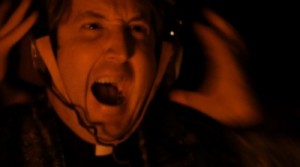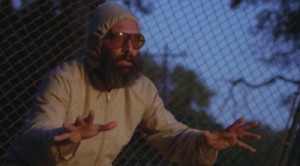By Kim Voynar Voynar@moviecitynews.com
Sundance Review: The Catechism Cataclysm and Septien
The Catechism Cataclysm

One of the weirdest — and funniest — films I saw at Sundance was The Catechism Cataclysm. I’m not sure it’s even possible to discuss this film in a way that makes sense, because I’m not sure the film itself even does make sense, but it sure as hell made me laugh out loud a lot.
In a nutshell, the film is about a priest named Father Billy (Steve Little), who gets sent on early vacation because he’s telling weird stories at Bible study that have noting to do with the Bible. Father Billy gets in touch with Robbie, his older sister’s rocker ex-boyfriend, who he completely idolized in high school. Now Robbie is all grown up and hasn’t achieved anything as wonderful with his life as Father Billy imagines. But they meet for breakfast at a local diner, and Father Billy persuades Robbie — who has nothing better to do, really — to accompany him on a canoe trip.
The pair get lost on the river, meet up with a pair of giggling-but-sinister Japanese girls named Tom Sawyer and Huck Finn, who are traveling down the river with a large, silent black man named Jim, and from there things just get curiouser and curiouser in ways that I really can’t explain without giving too much away. But trust me, it’s all weird as hell.
What I found most interesting about The Catechism Cataclysm, though, is the way in which it weaves the idea of storytelling into and around itself, from Father Billy’s inappropriate parables at the beginning, to the stories Robbie tells Father Billy as they’re floating down the river, to the deliberately exaggerated reference to Mark Twain. I’ve never seen anything quite like it.
Also, there’s a song toward the end that’s so hilariously blasphemous that my inner Catholic schoolgirl kept casting nervous glances at the ceiling, hoping to avoid any divine retribution that might descend upon the theater. At the same time, I was laughing so hard I nearly choked on my Vitamin Water.
The film is directed by Todd Rohal and exec produced by North Carolina School of the Arts alums David Gordon Green, Jody Hill, Danny McBride and Matt Reilly through their production company, Rough House Pictures, which, the press notes tell me, was founded in order to support other filmmakers in “creating comedy films slightly to the left of center.” I’d say this is a bit more than “slightly” to the left of center, but there you go.
This is one of those films you just have to check out for yourself to believe. Go into it expecting that it won’t make sense, or look at it all as a wildly hilarious metaphor for … I’m not sure what. But probably, you’ll stay engaged. And almost definitely, you’ll get a good laugh.
______________________________________________
Septien

Like The Catechism Cataclysm, Septien is one of the stranger films I saw at Sundance. But where Catechism was just funny-weird, and didn’t feel like it was reaching for anything much deeper than the interweaving of storytelling in a crazy way, Septien was weird for me in a way that was more meaningful, probably in part because it tells a much tighter story, and doesn’t feel like it’s trying to be odd just for the sake of oddness.
I was surprised by how much I liked this film based solely on its program description. It kind of reminded me of Dogtooth in a way; Dogtooth was set in Greece, Septien in the American South, but both explore similar themes around repressed sexuality and insularity by using a tightly controlled bizarrity of tone that you just don’t see pulled off well in a lot of films.
The general story here: Brothers Ezra (Robert Longstreet) and Amos (Onur Tukel) and their gentle, not-too-bright farmhand Wilbur (Jim Willingham) live on a remote, bedraggled farm. Long-lost brother Cornelius (played by director Mike Tully) returns abruptly after an 18 year absence, but refuses to speak about why he disappeared, or why he’s returned now. Con, as his brothers call him, is restless and wandering, unable to settle down. He spends his days wandering around town looking like the Unabomber with his hoodie, sunglasses and full-on hipster-Taliban beard, hustling the locals in pick-up games of basketball and tennis
Meanwhile Amos creates disturbing pictures of murder, mayhem and demons in the barn, and Ezra plays controlling mother to his brothers and Wilbur, wearing frilly aprons and cleaning gloves and obsessively bleaching and scrubbing every speck of “unclean” from the house.
One day after Con’s return the household toilet regurgitates the contents of their septic tank (metaphorical for past shit clogging up the brothers’ lives? Yeah, I expect so). Enter Red Rooster (Mark Darby Robinson), a grizzled, grumpy plumber who has a questionable relationship with Savannah (Rachel Korine), a pretty young girl who may or may not be his wife and may or may not be underage. There’s also wandering preacher of sorts who shows up on the farm, but to give away any more than that about how all these pieces tie together would be to give away the heart of the film, so you’ll have to watch it for yourself to see how that all plays out.
I’ve heard Septien described here at Sundance as comedy-horror, but it’s not really either. It’s not a comedy, though it’s funny at times, mostly in ways that a many folks will find inappropriate, and it’s certainly not a horror film — I wouldn’t even classify it as “gothic horror” though that probably comes closest to defining what it is — even though it’s playing in the Midnight section here at Sundance, perhaps because they couldn’t figure out where else to put it.
Even if you’re not at Sundance, you can watch Septien at home because it’s one of the films showing in Sundance Selects VOD. It’s definitely not a film for everyone, but if you’re of a particular cinematic mindset and you’re intrigued by weird but intelligent films, you should absolutely check it out. It’s crazy good.
















Do snuff films exist? find out: http://www.youtube.com/watch?v=EyF2A6UqnLI
ok i don’t know if that really is a snuff movie but whatever it is its GROSS
youtube musta thought it was real. It’s under investigation. What about the other socalled snuff films there. You’d think if there was a series, these guys would get caught. Get ’em youtube, lol.
Nothing original here… sad times for film, very sad times…